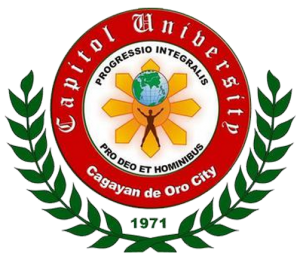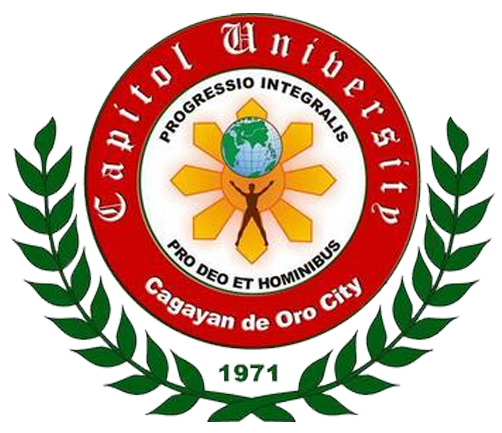History
Capitol University formerly Cagayan Capitol College was established in 1971 as a non – sectarian, co – educational private academic institution, duly registered with the Securities and Exchange Commission as a stock corporation and operates with the authority of the Department of Education for its primary and secondary programs and the Commission on Higher Education for its tertiary, graduate and postgraduate programs.
Upon its opening in 1971, the initial academic programs offered were a complete Secondary course and tertiary courses in Liberal Arts, Commerce, Education and Secretarial. In 1973, the first Midwifery program in Region X was opened together with the inauguration of a Maternity Hospital to support the practicum requirements of the Midwifery students. The following year or in 1974, the Nautical and Marine Engineering Programs were offered together with Civil Engineering and B.S. in Forestry. In 1976 the Mechanical Engineering, Nursing and Agricultural Technology programs were opened. On this very the same year, the M/V Capitol College, a 650 – ton freighter which served as the training ship for the Maritime Cadets, was acquired and commissioned. It was also during this time that the Maternity Hospital was upgraded into a General Hospital.
In 1981, the Graduate School was opened with M.A. in Filipino as the initial graduate program offering. Other graduate programs were later offered. Presently the Graduate School offers two Doctoral Programs and five Masteral Programs.
In 1987, the preschool and elementary departments were transferred to a spacious campus in Gusa, Cagayan de Oro City and named the St. Francis Learning Center, after St. Francis of Assisi.
To cater to the demands of the times, additional tertiary programs like Physical Therapy, Criminology and Computer Science were opened. Special programs like the CISCO International Networking Programs and the In – house review for the Nursing Licensure Examination were also opened and institutionalized, to give more opportunities to the graduates.
In order to put emphasis and institutionalize Research and Community Extension, the Capitol Institute for Research and Extension (CINREX) was created, the forerunner of the University’s Research and Extension Office (REXO).It is now called the Capitol University Research and
Extension Office (CUREXO).
To ensure the quality of its academic standards, the University embarked into accreditation of its programs with the Philippine Association of Colleges and Universities Commission on Accreditation (PACUCOA). Presently, its Liberal Arts, Commerce, Mechanical Engineering and Education Programs are undergoing Level 3 First Reaccreditation. The Nursing, Nautical Studies, Marine Engineering programs passed the Level III accreditation. The Graduate School programs namely MA Filipino, MA Education, MA Guidance and Counseling and Masters in Business Management are Level II Accredited. The Criminology and Computer Science programs passed the Level 1 Accreditation. Its Civil Engineering is gearing toward Level III accreditation. The Quality Standard System of the Maritime Education Programs is accredited by the Det Norske Veritas (DNV) and has been certified as ISO accredited.
Three colleges were declared by the Commission on Higher Education (CHED) as Center of Development. These are as follows: Criminology, Computer Studies and Civil Engineering. Lately, in 2010 the College of Education was certified as Center of Excellence.
Thirty – two years after its founding, or on February 3, 2003, by virtue of CHed en banc Resolution No. 028 series of 2003, this institution received its charter as a university. On May 2, 2003 it was formally inaugurated as CAPITOL UNIVERSITY with Atty. Casimiro B. Juarez, Jr. installed as the first University President.
On June 11, 1999 CHED granted the University the Expanded Tertiary Education Equivalency and Accreditation Program (ETEEAP) Certificate of Recognition.
On October 27, 2003 by virtue of CHED en banc Resolution No. 393 series of 2003. CAPITOL UNIVERSITY was granted DEREGULATED status in recognition of its quality education, integrity and untarnished reputation as an academic institution.
Capitol University has produced several top notchers in the licensure examination for Nurses as well as for teachers. In the recent licensure exam for nurses Capitol University surpassed the national percentage of passing and ranked first through out Region X.


